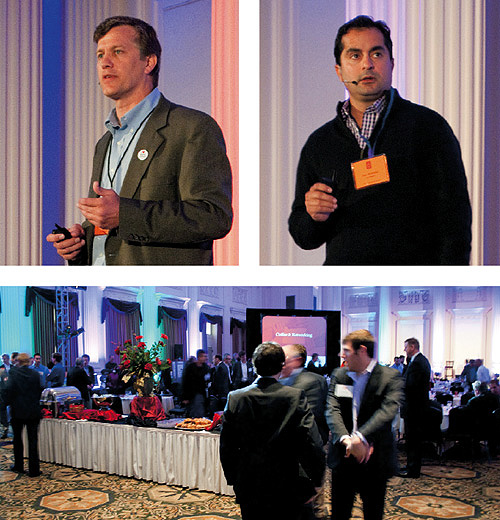 As bad as the job market has been for 2010, the capital-raising market has been surprisingly good, and this year’s finalists at Venture Northwest offered strong reasons as to why.
As bad as the job market has been for 2010, the capital-raising market has been surprisingly good, and this year’s finalists at Venture Northwest offered strong reasons as to why.
 |
Reenst Lesemann of Columbia Power Technologies (top left) and Dan Afrasiabi of CardPower (top right) pitch their business ideas at OEN’s Venture Northwest event at the Governor Hotel. // Photos by Shaun Strickland |
As bad as the job market has been for 2010, the capital-raising market has been surprisingly good, and this year’s finalists at Venture Northwest offered strong reasons as to why.
Among the companies vying for top honors in the annual event hosted by the Oregon Entrepreneurs Network were anti-malarial drug developer DesignMedix, wave energy specialist Columbia Energy Technologies and software developer GreenPrint, which has developed software to eliminate wasteful printing in the office.
Those finalists and the other businesses that made presentations all featured fresh ideas in growing markets ranging from e-commerce to DNA sequencers. Some are certain to join the growing list of Oregon companies that have scored venture funding, including Puppet Labs, Azuray Technology and G5 Search Marketing.
But the central theme from the gathering was that Oregon has a long way to go. Investments remain paltry compared to the money flowing into Seattle to the north and Silicon Valley to the south. Diane Fraiman of Voyager Capital ended the event with a call to action: “Do not settle for the status quo. We need to embrace innovation in new ways.”
What that might entail remains to be seen. State representatives Bruce Starr and Tobias Read hinted at growing momentum to lower Oregon’s capital gains tax burden. Newly elected state treasurer Ted Wheeler said he strongly supports using Oregon investment funds to support local businesses first. Portland mayor Sam Adams promised to build on the popularity of the city’s new seed fund for start-ups.
Oregon University System Chancellor George Pernsteiner acknowledged that there is room for improvement in the transfer of technology from universities to companies. “We’re slow and we know we’re slow,” he said. “That is a culture shift we will have to make.”
As a rather stinging reminder of how far Oregon has to go, Luis Mejia of Stanford University’s office of technology licensing pointed out that his program launched in 1970 and took 15 years to break even. But it eventually brought partnerships with Hewlett-Packard, Yahoo and Google.

